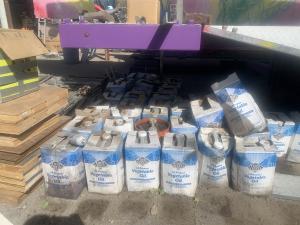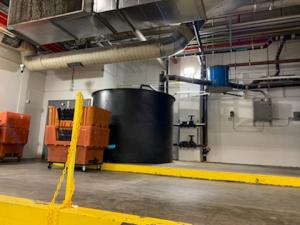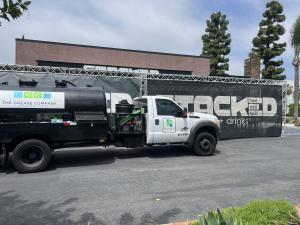How Recycling Used Cooking Oil Can Save Restaurants Money and Enhance Sustainability Efforts
Los Angeles restaurants turn waste oil into profit with TGC Plumbing’s certified collection, recycling, and eco-friendly grease management services.
What truly sets TGC apart is their focus on reliability and customer care. The company understands the importance of timely maintenance and reliable grease collection for busy restaurant operations”
LOS ANGELES, CA, UNITED STATES, November 5, 2025 /EINPresswire.com/ -- In today’s fast-paced food processing industry, waste management is turning out to be a growing concern for restaurants. For the food establishment owners, the disposal of their used cooking oil represents a costly, and time consuming task which they often overlook. However, what most of them don’t realize is that waste cooking oil or yellow grease, if properly collected and recycled, can actually be turned into valuable resources that not only helps the environment but also benefits the bottom line. By partnering with biodiesel manufacturers or waste oil recyclers, restaurants can monetize what would otherwise be a waste product, turning their oil into biofuels, animal feed, or even soaps. — TGC Plumbing
Cooking oil is one of the most commonly used products in commercial kitchens, with millions of gallons consumed every year. In cities like Los Angeles alone, restaurants go through tens of millions of gallons of oil annually. Report shows, tons of gallons of used cooking oil are improperly discarded every year, leading to clogged pipes, environmental pollution, and missed opportunities for profit. In fact, some restaurants are able to recover a significant portion of their operating costs simply by recycling their used cooking oil, creating a win-win situation for both their business and the planet.
From significantly reducing waste disposal costs to generating additional revenue through the sale of used cooking oil for biodiesel production, restaurants can achieve notable financial gains while simultaneously improving their environmental impact. By recycling used cooking oil, businesses not only cut down on costly waste management fees, but they also contribute in shaping a greener tomorrow by taking part in transforming a once-discarded byproduct into an environment friendly energy solution. As sustainability continues to be a top priority for consumers, businesses that adopt eco-friendly practices are not just helping the planet- they’re also gaining a competitive edge in the marketplace. Today’s consumers are increasingly looking for brands that align with their values, and many are willing to support restaurants that prioritize environmental responsibility. Embracing a green business model through reliable used cooking oil recycling can help restaurants attract more loyal customers, improve their public image, and differentiate themselves from competitors.
So, what happens when cooking oil is not properly recycled?
Well, it often ends up in landfills or is dumped down public drains, where it accumulates over time, and may cause a range of costly plumbing issues. For the restaurant owner himself, it can clog his kitchen pipes and overflow drainage systems, leading to plumbing repairs and increased maintenance costs that the business could have avoided. Restaurants spend hundreds, if not thousands, of dollars annually fixing different plumbing issues caused by improperly disposed of yellow grease.
Beyond increased plumbing costs, the environmental impact of improperly discarded used cooking oil is substantial. Sticky grease from used oil is harmful to ecosystems and can contaminate local water sources resulting in massive water pollution. When oil is dumped into drains or landfills, it doesn’t break down like organic waste, and instead, it leaches harmful chemicals into the environment. This pollution can damage aquatic life, disrupt local wildlife, and contribute to soil degradation. As environmental regulations become stricter, restaurants may also face fines or penalties for improper disposal.
Recycling used cooking oil offers restaurants an easy, highly effective and the most environmentally‑friendly way to deal with their toxic by‑product. It doesn’t just reduce their environmental footprint but also unlocks new revenue opportunities. Yellow grease, often referred to as “yellow gold” in the recycling industry, can be transformed into valuable products such as biodiesel, animal feed, and soaps, turning what would otherwise be waste into a profitable resource. The commercial opportunity is significant. The global used cooking oil (UCO) market was recently estimated at around USD 8.0 billion in 2024 and is projected to grow to nearly USD 12.0 billion by 2030, representing a compound annual growth rate (CAGR) of approximately 7%. Around half of that market is driven by the biodiesel sector, meaning large volumes of used cooking oil are being purchased by fuel and bio‑product companies. For restaurants, this means there is a ready and growing demand for collected oil, and a recycling pathway that provides income rather than cost.
Beyond generating income, recycling used cooking oil also helps restaurants cut waste disposal costs. Instead of paying for the removal of oil, many businesses are able to sell it to recyclers, reducing waste management expenses and improving overall operational efficiency. This approach creates a win-win situation: restaurants save money, reduce their environmental impact, and contribute to the production of cleaner energy and sustainable products.
Sustainability is no longer just a buzzword- today’s diners increasingly value businesses that prioritize eco-friendly practices. Restaurants that embrace used cooking oil recycling can enhance their reputation, attract environmentally-conscious customers, and gain a good reputation as a responsible business.
In the dynamic food processing industry of SoCal, not all waste is considered equal- especially when it comes to used cooking oil or expired food grade cooking oil. To ensure both safety and compliance, only authorized used cooking oil collectors, commonly known as IKG haulers, are legally permitted to handle, transport, and recycle inedible kitchen grease (IKG). These haulers are licensed by local and state authorities, such as the California Department of Food and Agriculture, to collect grease from commercial food processing establishments and deliver it to certified recycling or rendering facilities. Attempting to dispose of or transport used cooking oil without proper authorization is not only illegal, it can also pose serious environmental risks.
When selecting an IKG hauler, restaurants should consider several key factors. First, the hauler must hold the proper licenses and permits, carry adequate insurance, and be able to provide references or proof (also known as Manifest Report) of experience in commercial grease collection. Transparency is also essential- haulers should supply clear documentation of every collection, including manifests, receipts, and a record of the final recycling destination. Operational performance is equally important. A professional hauler will provide secure, labeled containers, pick up used oil according to a reliable schedule, and maintain vehicles and equipment to prevent leaks or contamination. They should also respond quickly to container capacity alerts or emergencies, ensuring that the kitchen workflow remains uninterrupted.
TGC Plumbing, a trusted name in restaurant grease management across Los Angeles County stands at the forefront of sustainable kitchen waste management solutions. With years of industry experience, TGC Plumbing has built its reputation on professionalism, compliance, and eco-conscious service- helping restaurants manage their waste responsibly while keeping their operations running smoothly.
At the heart of the company’s mission is its commitment to providing safe and efficient Used Cooking Oil Collection services to commercial kitchens. They ensure that every gallon of used cooking oil is collected, transported, and recycled in accordance with the highest environmental and safety standards. By partnering exclusively with authorized recycling facilities, TGC Plumbing guarantees that all used oil is repurposed responsibly. To make the process even more convenient for restaurant owners, they provide secure used cooking oil storage containers free of charge. These durable, leak-resistant containers are designed to keep your kitchen area clean, safe, and compliant while simplifying oil disposal. Once full, their professional collection team arrives promptly to pick up the oil, ensuring a seamless and worry-free recycling experience. What truly sets them apart is their focus on reliability and customer care. The company understands the importance of timely maintenance and transparent service for busy restaurant operations. With flexible scheduling, emergency response capabilities, and competitive pricing, TGC Plumbing ensures that its clients can focus on their business- while the experts handle the mess.
For restaurants seeking to improve sustainability, reduce waste, and comply with local grease management regulations, TGC Plumbing’s Used Cooking Oil Collection service is a smart, eco-friendly, and cost-effective solution for restaurants in Los Angeles County. Every pickup not only helps protect the environment but also turns a kitchen byproduct into a valuable resource.
Take the next step toward cleaner operations and a greener future. Contact TGC Plumbing today to schedule a service or learn more about how your restaurant can benefit from professional grease management and oil recycling.
Phone: (888) 697-8910
Email: webmaster@thegreasecompany.com
Website: https://tgcplumbing.com
Anik H.
The Grease Company
Webmaster@thegreasecompany.com
Visit us on social media:
Facebook
YouTube
Legal Disclaimer:
EIN Presswire provides this news content "as is" without warranty of any kind. We do not accept any responsibility or liability for the accuracy, content, images, videos, licenses, completeness, legality, or reliability of the information contained in this article. If you have any complaints or copyright issues related to this article, kindly contact the author above.




